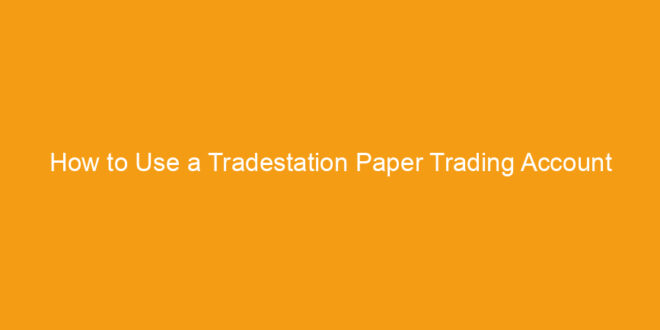Tradestation paper trading accounts are an excellent way for beginner traders to practice their trading strategies without putting their capital at risk. Paper trading allows traders to simulate the experience of trading without using real money. Tradestation provides a virtual trading environment where traders can practice trading without any financial risk.
Before starting to trade with a paper trading account, traders should understand the basics of the stock market. They should familiarize themselves with the market indices, trading platforms, and common trading terms. Additionally, they should have a basic understanding of fundamental and technical analysis.
Once traders have a basic understanding of the stock market, they can begin setting up their Tradestation paper trading account. The first step in setting up an account is to register and create a username and password. Once registered, traders will be able to access their paper trading account. The next step is to select the trading platform. Traders should select the platform that best fits their trading style and needs.
Once the trading platform is selected, traders will be able to start trading virtual funds in their paper trading account. They can select from a variety of stocks, options, and ETFs to trade in the account. Traders should use the same trading strategies they would use with a real account to practice and perfect their trading techniques.
Traders should also take advantage of the tools and features available in the paper trading platform. They can use the charts, indicators, and other analysis tools to practice their technical analysis skills. Additionally, they can use the platform to monitor their trading performance and track the gains and losses of their virtual trades.
Tradestation’s paper trading account is an excellent way for beginner traders to practice and perfect their trading strategies without risking their capital. Through the use of the platform’s tools and features, traders can easily learn and hone their trading skills.
Exploring the Benefits of a Tradestation Paper Trading Account
A Tradestation paper trading account is a powerful tool that can be used to gain a better understanding of the markets and develop an effective trading strategy. By simulating actual trading conditions, a paper trading account allows traders to practice and refine their skills without risking their capital.
Paper trading accounts have numerous benefits for both novice and experienced traders. Firstly, they provide a safe environment to practice trading strategies. Traders can observe how their strategies perform in different market conditions and make adjustments as needed. This helps them to identify their strengths and weaknesses and develop the necessary skills to become successful traders.
Paper trading accounts also provide traders with the opportunity to test new ideas and strategies without risking their capital. This allows traders to experiment with new trading strategies and concepts without fear of incurring losses. In addition, paper trading accounts provide traders with a way to practice with different trading platforms and tools. By familiarizing themselves with the features of these platforms, traders can gain a better understanding of how they can be used to their advantage.
Finally, paper trading accounts can be used to develop a greater understanding of the markets. By simulating real-time market conditions, traders can gain insight into how the markets work and what factors influence them. This knowledge can then be used to formulate more effective trading strategies and decisions.
In conclusion, a Tradestation paper trading account can be a powerful tool for traders of all levels. By simulating real-world market conditions, traders can gain a better understanding of the markets and develop effective trading strategies without risking their capital. This can be a valuable asset for any trader who is serious about succeeding in the markets.
Strategies for Optimizing Performance in a Tradestation Paper Trading Account
1. Stick to the Plan: Before starting to trade, develop a trading plan and stick to it. A plan should include a well-defined risk management strategy, entry and exit strategies, and set trading goals. When trading in a paper trading account, it is important to understand that trading decisions should be based on sound analysis and not on emotions.
- Set Realistic Goals: Before starting to trade, it is important to set realistic goals. It is important to understand that paper trading accounts can be used to gain experience and knowledge, but they cannot guarantee profits. Setting realistic goals that are achievable helps to ensure that performance is optimized.
- Utilize Automation: Automation can be a powerful tool when trading in a paper trading account. Automation can help to streamline the trading process, reduce errors, and increase efficiency. Automation can also help to reduce emotions and improve the quality of decisions.
- Monitor Performance: Monitoring performance is essential when trading in a paper trading account. It is important to track the performance of each trade, as well as the overall performance of the portfolio. This can help to identify areas of strength and weakness, and inform future trading decisions.
- Manage Risk: Risk management is essential when trading in a paper trading account. It is important to understand the risks associated with each trade and to manage them appropriately. Strategies such as stop losses and position size can help to ensure that losses are minimized and profits are maximized.
- Use Technical Analysis: Technical analysis is an important tool when trading in a paper trading account. Technical analysis can help to identify trading opportunities, inform entry and exit strategies, and optimize performance.
- Utilize Backtesting: Backtesting can be a valuable tool when trading in a paper trading account. Backtesting allows traders to test their strategies using historical data, so that they can identify potential weaknesses and make adjustments before entering a live trading environment.

